During this time period, McGill Law found its place at home and abroad. At home, the Faculty finally received a permanent location on campus when it was given Old Chancellor Day Hall in 1948. From its new home, the Faculty continued to grow in prominence within Canada. The student body swelled with returning veterans who had served in World War II as well as students inspired by the increasing accessibility of the legal profession in Quebec. For instance, women could join the Quebec Bar as of 1941, and Quebec appointed its first Jewish judge, Harry Batshaw, in 1950. McGill Law students started Canada’s first law review and set the national standard for legal citation with the McGill Law Journal, and the Faculty continued to attract and produce influential figures such as Brooke Claxton, Gerald Fauteux, Louis Baudouin and Arnold Heeney.
McGill Law also found its place abroad during these years by embracing its international character. Students went overseas to contribute to the war effort, John Peters Humphrey penned the Universal Declaration of Human Rights, and John Cobb Cooper founded the globally-renowned Institute of Air and Space Law. By the early 1950s, McGill Law’s enrolment was at an all-time high and it had cemented its place as a leading national and international institution.
In this period
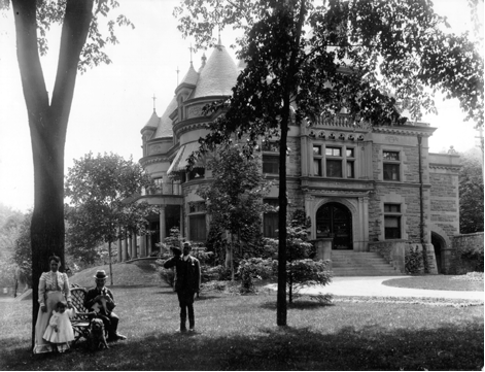
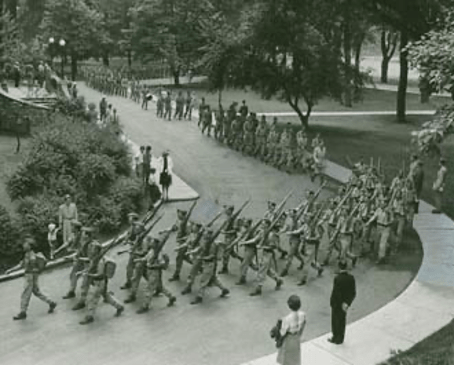
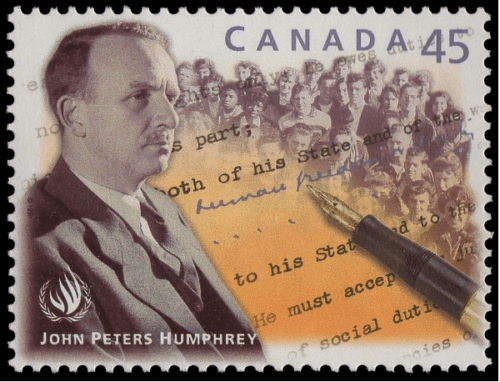
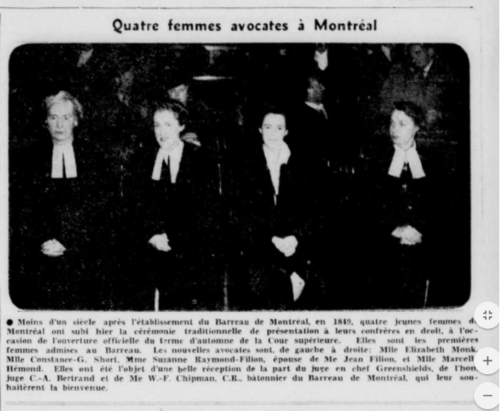
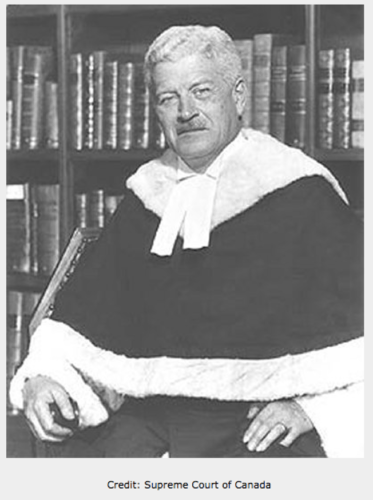
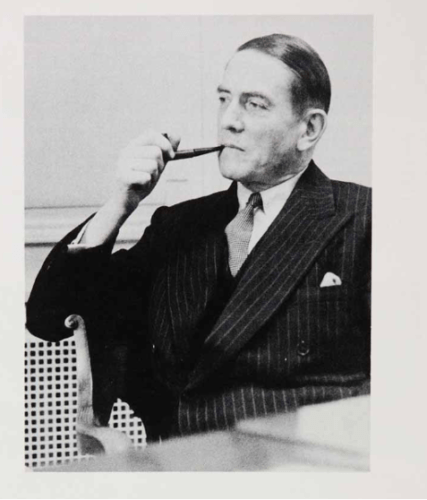

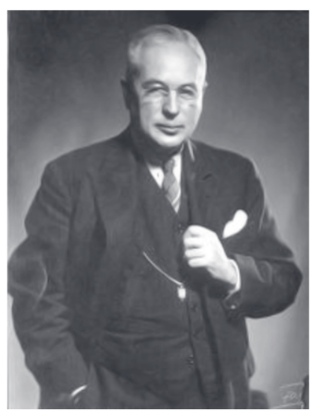
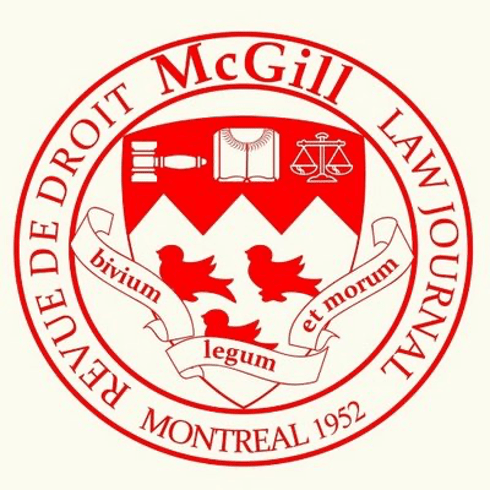
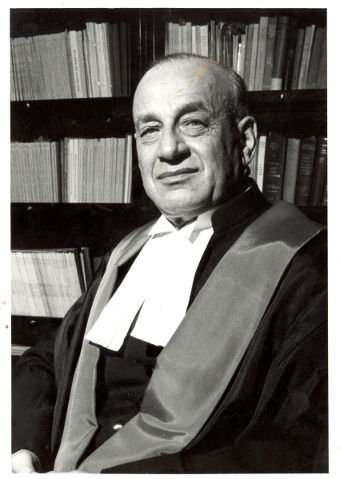
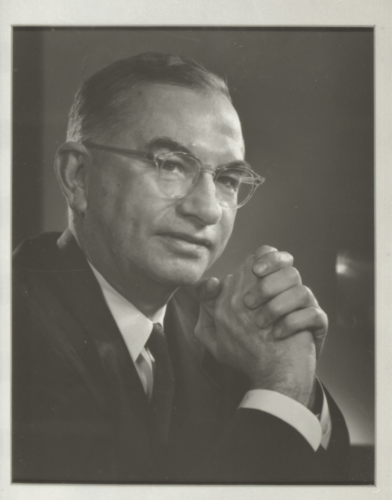
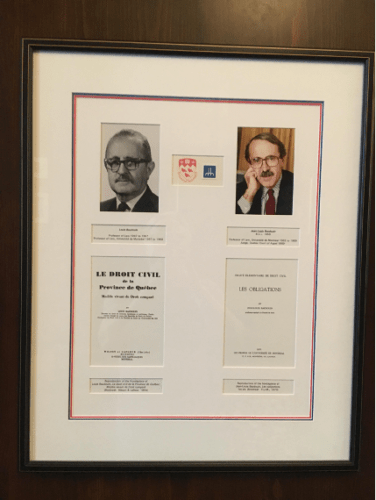
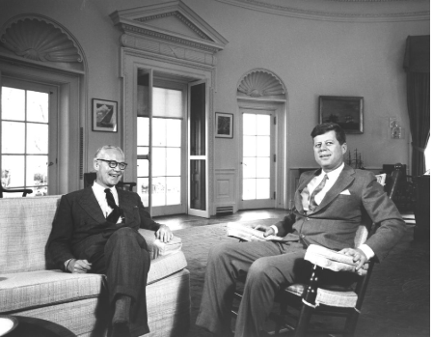
Old Chancellor Day Hall

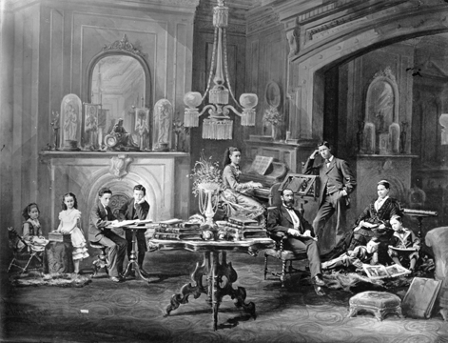
The building that is now Old Chancellor Day Hall was previously known as the Ross Mansion. The building was named after James Ross, who made his fortune in the railway business, and had the house built in 1890. When the house was built, it was one of the most expensive private homes in Canada. It was designed by the architect Bruce Price, who also designed Windsor Station and Chateau Frontenac, and is built mostly of iconic yellow sandstone imported from New Brunswick. Ross—a noted philanthropist who paid for the construction of several hospitals, including the Royal Victoria, and who donated to McGill University, the Museum of Fine Arts, and numerous other institutions—lived and died in the Ross House. Ross’s son, John Kenneth Leveson Ross, was obliged to sell the house after spending his fortune on horse-racing and parties. Old Chancellor Day Hall was donated to McGill in 1948 by J.W. McConnell, another well-known philanthropist who later acquired the house.
With the donation of OCDH to McGill, the Law Faculty finally found a permanent home for the first time in its hundred-year existence. The Ross Mansion was renamed Chancellor Day Hall in honor of Chancellor Dewey Day, a major figure in McGill’s history and one of the drafters of the Civil Code of Lower Canada. The building became Old Chancellor Day Hall with the construction of New Chancellor Day Hall in 1967.
World War II

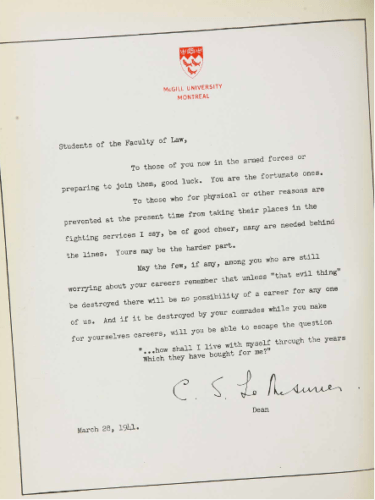
Pictured above (left) are Canadian soldiers training on McGill’s campus. Canada declared war on Germany on September 10, 1939. McGill students, graduates and even staff members served in World War II in many different roles. In 1941, Dean Le Mesurier wrote a letter about the contributions required by McGill Law students in the war effort. He wrote that “unless ‘that evil thing’ be destroyed there will be no possibility of a career for any one of us”. Ruth Hill Stanley (B.C.L. 1945) wrote that the war years were “a time of great anxiety and restlessness” at the Law Faculty. Among the concerns was the fear that the Faculty of Law could not shelter its students in the event of an air raid on Montreal. While the Faculty remained safe, by the end of the war seven McGill Law graduates had lost their lives fighting.
After World War II, admissions to McGill Law sharply increased. The first year class in 1946 counted 80 students, more than four times the previous year. According to Marie-Claire Kirkland, the returning soldiers “presented a curious mixture of mature outlook and a penchant for playing childish pranks, perhaps to make up for lost opportunities earlier.”
John Peters Humphrey

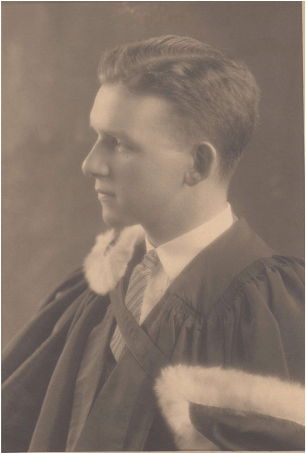
John Peters Humphrey (B.C.L. 1929, LL.D. 1976) was a Gale Professor of Law at McGill, teaching Roman and International Law from 1936–46. Although he was appointed Dean in 1945, he never served in that capacity as he left McGill in 1946 to join the United Nations. There, his greatest achievement was his first draft of the Universal Declaration of Human Rights. During the process of writing the Declaration, Humphrey collaborated closely with Eleanor Roosevelt (the First Lady and American Representative to the United Nations Commission on Human Rights). Humphrey also created the Canadian branch of Amnesty International and served on the Royal Commission on the Status of Women. Humphrey was a champion of biculturalism, bilingualism, social security, and individual rights in Canada. On the left, Humphrey and his marked-up draft of the Declaration is memorialized in a Canadian stamp.
On the right, Humphrey is pictured during his studies at McGill. He was incredibly successful in life despite adverse circumstances. Humphrey was an orphan; his father died when he was not even a year old and his mother passed away when he was 11. He also lost one of his arms when he was six years old in a fire.
Women at the Bar

Women were finally allowed to join the Quebec Bar in 1941, over twenty-five years after Annie MacDonald Langstaff was originally denied this right in 1915. In 1942, Elizabeth Monk (B.C.L. 1923, LL.D. 1975), Constance Garner Short (B.C.L. 1936), Suzanne Raymond-Filion, and Marcelle Hémond were the first four women to be admitted.
Short was admitted to the Bar in 1941 and, within two years, became the first woman to plead in front of the Quebec Superior Court as well as the Admiralty Court of Canada. Monk was an exceptional student and an important figure in women’s rights in Quebec. She worked in a major Montreal law firm, as a radio journalist, and as a Montreal city councilor. In 1979, her friends and colleagues set up a prize in her name for the McGill law student with the highest standing in property law. In 1980, she was one of five women presented with the Governor General’s Award on the anniversary of the Persons Case for her work on women’s suffrage.
Dean Gérald Fauteux

Gérald Fauteux (LL.D. 1955) was Dean of McGill Law for one year in 1949 before he was appointed to the Supreme Court of Canada. He served on the Supreme Court until 1973, acting as Chief Justice for the last three years of his term. He had previously worked as a professor of criminal law at McGill from 1936 to 1949 and continued to have an interest in pedagogy even once on the bench.
During his time at the Supreme Court, he helped found Ottawa’s Faculty of Law and became its first Dean from 1953–1962. The Faculty of Ottawa’s main building is named Fauteux Hall in his honor.
Dean William Campbell James Meredith

William Campbell James Meredith was Dean of McGill Law from 1950 to 1960. As Dean, he oversaw and supported the creation of the Institute of Air and Space Law and the McGill Law Journal. He presided over the Faculty during a period of growth, as class sizes grew consistently throughout the 1950s. In 1951, he added a fourth year of study to the programme in which students worked in offices to obtain a practical education.
Meredith also published important works such as “Insanity as a Criminal Defence” (1931) and “Civil Law on Automobile Accidents, Quebec” (1940) as well as two successful manuals for practitioners. After his death, the Faculty launched the Meredith Memorial Lectures, which promote continuing legal education for members of the Quebec legal community. These lectures are published as books and the proceeds fund the W.C.J. Meredith Research Fund.
Lord Reading Society
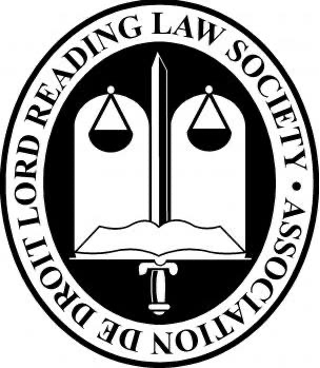

The Lord Reading Law Society is an organization established to ensure the fair representation of Jews in Montreal’s and Quebec’s legal community. The Society was founded when the 1948 annual Convention of the Quebec Bar was booked at a lodge that had the policy of “no Jews and no dogs.” Jewish lawyers decided to boycott the Convention and to establish a society which would assure fair treatment of Jewish lawyers in Quebec.
On the right, the Lord Reading Past Presidents’ table in 1988 is pictured. Many of the Society’s past presidents—including its first, Benjamin Robinson (B.C.L. 1918)—graduated from McGill Law. Since its founding, the Society has become an essential part of Quebec’s legal community and plays an especially significant role in public debates, advocating for human rights and freedoms, bringing together important speakers, and recognizing members of the community and their contributions.
Institute of Air and Space Law

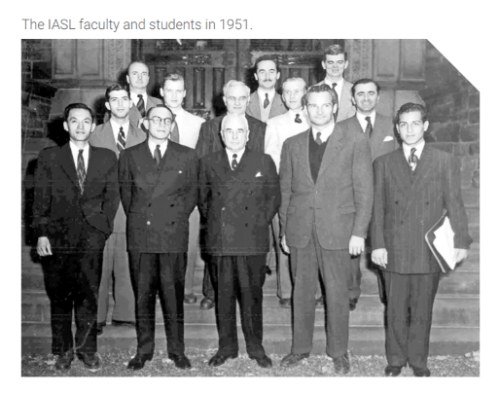
McGill Law became home to the world’s first Institute of Air Law in 1951, under the leadership of John Cobb Cooper in collaboration with Dean W.C.J. Meredith and the International Air Transport Association (IATA). McGill was a fitting home for the Institute since Montreal was the site of the newly-inaugurated International Civil Aviation Organization (ICAO). The Institute was designed for graduate studies and resurrected the LL.M. program which had been abolished in 1924. After the first satellites were launched in 1957, the Institute expanded to become the Institute of Air and Space Law. Since its inception, the Institute has attracted students from around the world, cementing McGill Law’s international reputation.
John Cobb Cooper (LL.M. 1952), left, “the father of the law of outer space,” was instrumental in establishing the Institute of Air Law. Prior to acting as the Institute’s first director and professor, he served as advisor to Presidents Truman and Eisenhower, as legal advisor to IATA, and as Vice-President of Pan American World Airways. A pioneer in his field, he published the seminal work, “The Right to Fly”, and several other important articles. On the right, Cooper is seen in the front row and centre of the Institute’s first set of students, including future innovators in this field like Huib Drion, Kurt Gronfors, and Ming-Min Peng.
McGill Law Journal

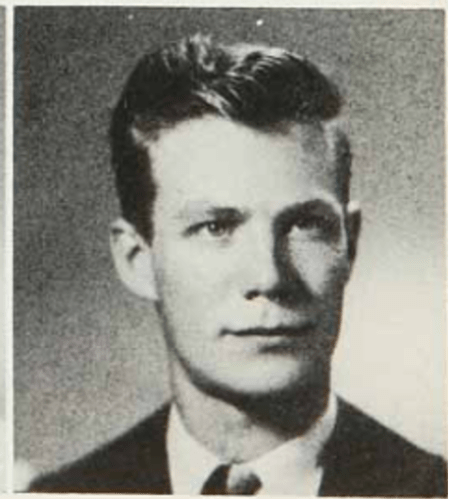
The McGill Law Journal was founded in 1952 by student Jacques-Yvan Morin (above right). Morin first had the idea to start the Journal after a conversation with Gerald Le Dain, who was then finishing his graduate studies. Morin and Le Dain believed that the Faculty needed a review to publish student papers. Morin later became a professor of constitutional and international law at the University of Montreal and a prominent Quebec politician.
The first issue included articles by Le Dain, John Cobb Cooper, Maxwell Cohen, and Louis Baudouin. In the foreword to the issue, Morin emphasized that Quebec stood “at the confluence of two great systems of Private Law,” making “McGill’s potential contribution to a better mutual understanding unique.” The bilingual Journal is the oldest student-run law review in the country with its first issue published in 1955. It quickly became an internationally-renowned forum for innovative legal scholarship. Its citation guide, the McGill Guide, is the official style for Canadian legal citation.
Harry Batshaw: First Jewish person Appointed to Superior Court

Harry Batshaw (B.C.L. 1924) is best known for being the first Jewish person appointed to a Superior Court in Canada. Upon graduating, he won the Elizabeth Torrance Gold Medal and the Macdonald Traveling Scholarship. In 1949, he was appointed to the Superior Court of Quebec, where he served for 27 years. To this day, students with the highest standing in Foundations of Canadian Law win the Mr. Justice Harry Batshaw Prize, established from the legacy he left after his death in 1985.
Batshaw was globally respected as a lifelong advocate of human rights and justice, serving as chairman of the human rights committee of the UN Association of Canada and founding the Canadian Human Rights Foundation (now Equitas) along with Thérèse Casgrain, Maxwell Cohen, Paul-André Crépeau, and John Humphrey in 1967. He was also active in the Zionist Organization of Canada, and was co-chairman of Amitiés Culturelles Canada-Français-Israel.
Brian Brooke Claxton

Brian Brooke Claxton (B.C.L. 1921, LL.D. 1950) was a prominent Quebec lawyer before he was appointed Associate Professor of commercial law at McGill’s Faculty of Law in 1930. In 1940, Claxton was elected as a Liberal Member of Parliament. During his political career, Claxton served as parliamentary assistant to Prime Minister Mackenzie King, as Minister of National Health and Welfare (1944–1946), and as Minister of National Defence (1946–1954). In total, Claxton was a Member of Parliament for 14 years. Claxton was an accomplished politician: he was largely responsible for the family allowance program introduced in 1945, negotiated Newfoundland’s entry into Canada in 1949, oversaw Canada’s involvement in the Korean War, and rebuilt Canada’s military after World War II. He also represented Canada abroad at the Paris Peace Conference in 1946. Claxton retired from politics in 1954, later working as the Vice-President of Metropolitan Life Insurance Company. In 1957, he was appointed the first Chairman of the Canada Council for the Arts.
Prior to his studies, Claxton fought in World War I and received the Distinguished Conduct Medal for his service. He was a member of the Famous Class of Law ’21.
Louis Baudouin: Recruited From France

In 1948, Louis Baudouin became the first civilian professor recruited from France to teach at McGill’s Faculty of Law. Baudouin had previously given law lectures in France and had been a magistrate, acting as a substitut du Procureur de la République from 1932 to 1946. Baudouin was “the first civil law teacher since Walton to elevate the subject above simple exegesis of Codal texts, and to seek out its underlying themes.” Throughout his career, Baudouin championed civil law and comparative law within the Law Faculty. He established, along with professor Jean-Gabriel Castel, a bilingual comparative law seminar in 1956. He passed away a few hours after giving his last lecture.
Jean-Louis Baudouin (B.C.L. 1958, LL.D. 2007), son of Louis Baudouin, was a visiting professor at McGill’s Faculty of Law in 1969 and 1977. He served on the Quebec Court of Appeal from 1989 to 2009. He is renowned in Quebec for his textbook Les obligations and his annotated Civil Code of Quebec. He was a professor at the University of Montreal’s law faculty and, like his father, his areas of interest are civil law and comparative law.
Arnold Heeney
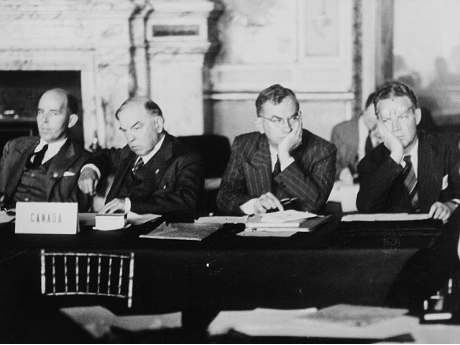

Arnold Heeney (B.C.L. 1929, LL.D. 1961) served as Principal Secretary to Prime Minister William Mackenzie King, as Clerk of the Privy Council, and as Undersecretary of the Department of External Affairs—all prior to his career as a foreign diplomat. As the Clerk of the Privy Council, Heeney was the highest-ranking Canadian bureaucrat during the Second World War. He is pictured above (left) at the Paris Peace Conference (right-hand side of the photo) with Prime Minister Mackenzie King (second from the left) and fellow McGill Law graduate, National Defense Minister Brooke Claxton (centre). Heeney went on to serve as the Ambassador to NATO and to the United States. He is pictured above (left hand side in the right photo) with President John F. Kennedy in the Oval Office in 1962.
Prior to these distinguished accomplishments, Heeney earned his law degree at McGill after returning from Oxford, where he studied as a Rhodes Scholar. At McGill, he was particularly influenced by Dean Percy Corbett, much like his classmate John Humphrey. In his junior year, Heeney was the Treasurer of the Law Undergraduate Society, who met “in unofficial capacity… at least twice a day, in the smoking room of the East Wing.”
